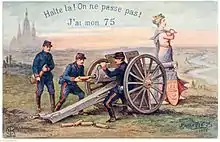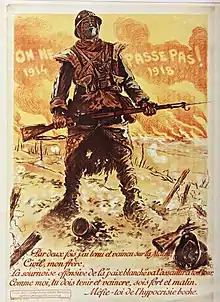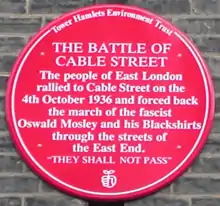They shall not pass
"They shall not pass" (French: Ils ne passeront pas!; Spanish: ¡No pasarán!; Romanian: Pe aici nu se trece!) is a slogan used to express determination to defend a position against an enemy.

French card, 1915

Propaganda poster by Maurice Neumont
It was most famously used during the Battle of Verdun in the First World War by French General Robert Nivelle. It appears on propaganda posters, such as that by Maurice Neumont after the Second Battle of the Marne, which was later adopted on uniform badges by units manning the Maginot Line. Later during the war, it was also used by Romanian soldiers during the Battle of Mărășești (the Romanian translation of the phrase is "Pe aici nu se trece", literally meaning "One does not pass through here").
Léon Blum, in 1934, used this sentence "ils ne passeront pas !" against the Ligue's demonstration of the 6 February.[1] "Ils" ("they") designated the fascist protesters.
It was also used during the Spanish Civil War, this time at the Siege of Madrid by Dolores Ibárruri Gómez, a member of the Communist Party of Spain, in her famous "No pasarán" speech on 18 July 1936.[2] The leader of the Nationalist forces, Generalísimo Francisco Franco, upon gaining Madrid, responded to this slogan by declaring "Hemos pasado" ("We have passed").
"¡No pasarán!" was used by British anti-fascists during the October 1936 Battle of Cable Street, and is still used in this context in some political circles. It was often accompanied by the words nosotros pasaremos (we will pass) to indicate that communists rather than fascists will be the ones to seize state power.[3]
The phrase was brought to the public consciousness again following action in December 1943 by French-Canadian officer Paul Triquet of the Royal 22e Regiment; his action included his use of Nivelle's phrase "to win a key objective at Ortona, Italy, in the face of overwhelming German opposition."[4]
In the 1980s, the phrase ¡No pasarán! was a theme in the civil wars in Central America, particularly in Nicaragua.[5] Nicaragua no pasarán is also the title of a 1984 documentary by David Bradbury about the events in Nicaragua that led to the overthrow of Somoza's dictatorship.[6][7][8]
In popular culture
- In The Fellowship of the Ring by J. R. R. Tolkien, a veteran of WWI who had fought at the Battle of the Somme, the wizard Gandalf shouts "You cannot pass!" at a Balrog, before cracking the bridge with his staff and being dragged into the abyss along with the Balrog. In the 2001 Peter Jackson movie The Lord of the Rings: The Fellowship of the Ring, Gandalf warns the Balrog first with "You cannot pass!" before crying "You shall not pass!".
- The WWI first-person shooter video game Battlefield 1 features a downloadable content update titled "They Shall Not Pass". The update features the Battle of Verdun, Battle of Soissons, Fort Vaux, Second Battle of the Marne and the Nivelle Offensive.[9][10]
- Author Max Brooks referenced the phrase in his book World War Z, a fictional oral history of a worldwide war between zombies and the living. During France's counteroffensive against the living dead, a team of commandos moving through a tunnel breaks through a wall to find three hundred zombies on the other side. The last words heard from the squad's leader: "On ne passe pas!"
- The title of Scottish documentary Nae Pasaran, which focuses on Scottish solidarity with Chile during the Pinochet dictatorship, is a play on the phrase using the Scots word nae.
- In the sitcom Whack-O, Chiselbury School for the Sons of Gentlefolk had "They shall not pass" as its school motto.[11]
- The song Fields Of Verdun, by the music group Sabaton, has a line which states "... It was said, ‘They shall not pass!’”. The "History Version" of the song has a female voiceover at the beginning, stating "This is Verdun. Here - they shall not pass!".
Gallery
.jpg.webp) On ne passe pas! on a French medal commemorating the Battle of Verdun
On ne passe pas! on a French medal commemorating the Battle of Verdun Red plaque commemorating the Battle of Cable Street
Red plaque commemorating the Battle of Cable Street Tomb of the unknown soldier at the Mausoleum of Mărășești with the inscription "Pe aci nu se trece - Mărășești 1917"
Tomb of the unknown soldier at the Mausoleum of Mărășești with the inscription "Pe aci nu se trece - Mărășești 1917"
See also
| Wikisource has original text related to this article: |
- Awake iron!
- Molon labe
- Order No. 227 (Stalin's "Not one step back" order)
- Venceremos
- Raised fist
- List of last stands
References
- "1936, le Front Populaire et des lendemains qui chantent". www.franceinter.fr (in French). Retrieved 2020-11-20.
- Ibárruri, D.; Ibárruri, I.D.; Partido Comunista de España (1966). They Shall Not Pass: The Autobiography of La Pasionaria. New world paperbacks. International Publishers. p. 195. ISBN 978-0-7178-0468-9. Retrieved 2020-06-22.
- Audrey Gillan (2006-10-02). "Day the East End said No pasaran to Blackshirts". The Guardian. London. Retrieved 2012-06-21.
- "French Canadian Wins Victoria Cross". Ottawa Citizen. March 6, 1944. Retrieved September 15, 2014.
- Kunzle, David (1995). The Murals of Revolutionary Nicaragua, 1979–1992. University of California Press. p. 168. ISBN 9780520081925.
- Kallen, Stuart A. (2009). The Aftermath of the Sandinista Revolution. Twenty-First Century Books. p. 152. ISBN 9780822590910.
- "Nicaragua: No Pasaran". Frontline Films. Retrieved 30 June 2015.
- FitzSimons, Trish; Laughren, Pat; Williamson, Dugald (2011). Australian Documentary: History, Practices and Genres. Cambridge University Press. p. 267. ISBN 9780521167994.
- "Battlefield 1 Update Notes – They Shall Not Pass Update". Battlefield. Retrieved 2017-10-22.
- "Battlefield 1: They Shall Not Pass guide: trench raider class, new maps, tanks, weapons, release date – everything you need to know". VG247.com. Retrieved 2017-10-22.
- Slide, A (2018) Wake up at the Back There: It's Jimmy Edwards. Albany, GA: Bear Manor Media. https://books.google.ca/books?id=j8xgDwAAQBAJ